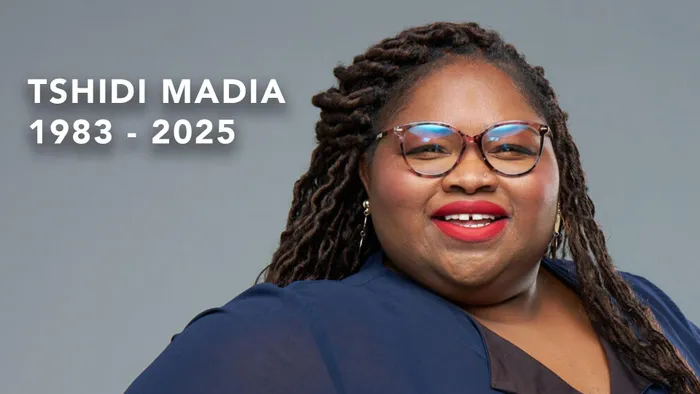Remembering Tshidi Madia: A Legacy of Integrity in Journalism

Tshidi Madia, a formidable journalist and political correspondent, leaves behind a legacy defined by integrity, courage, and a commitment to truth. This tribute explores her significant contributions to journalism and her role as a champion for women in media, writes Kenny Morolong
Image: Supplied
Tshidi Madia was a formidable journalist who carved out a space as one of the country’s most respected political correspondents. She embraced this significant role throughout the years with integrity, depth, and courage.
To truly capture the life and impact of renowned journalist and broadcaster Tshidi Madia in a few words is an impossible task. However, her larger-than-life personality, her passion for journalism and her love for her country will forever define her legacy.
Madia was a beacon of principled journalism in an era too often marred by sensationalism. She understood that her craft was about providing clarity, context, and unbiased reporting.
It is Tshidi Madia who showed us that democracy flourished when citizens are well-informed, she demanded transparency but never compromised on fairness which helped bridge the gap between the state and the public.
She asked the tough questions, insisted on clear answers, and pressed for openness. She had a balanced approach and rooted in the conviction that truth serves both the public and the state.
Through this, Madia helped elevate the practice of political reporting in South Africa. She demonstrated that journalists could push government to be transparent without descending into hostility. This rare blend of toughness and fairness earned her respect among government communicators.
Madia was collegial and had a vibrant personality, government communicators knew that she would always make contributions on how best they communicate with citizens, she never faltered to also correct when things went wrong.
She was also a tough and stern negotiator for media to have access to government messengers and for smooth running of coordination of media and government relations.
Madia broke through the persistent glass ceiling that still defines many newsrooms and became a formidable voice for women in media leadership.
She was acknowledged for her skills and her contribution to shaping political discourse in South Africa. The media organisations she worked for recognised her unique talent and rewarded her commitment by creating space for her growth in the sector. This is particularly commendable in an era where the call for the advancement of women into managerial and leadership positions is louder and stronger than ever before.
Whether this recognition was organic or intentional on the part of these media organisations, it is important for us to acknowledge and encourage them to continue creating more space for women to lead and make decisions in newsrooms.
Ironically, Tshidi’s departure coincides with the country’s commemoration of Women’s Month, and I must emphasise that women are the backbone of our country. Who is best to tell the story of poverty alleviation, gender-based violence, and the pursuit of gender equity if not women themselves?
Through her work, Madia reminded us that the media are vital partners in advancing our democracy, building our nation, and standing at the vanguard in exposing corruption and wrongdoing. She exuded strength and confidence of someone who knew her craft and who she is.
As I recall the engagement she had with American media during President Ramaphosa’s first meeting with the current President of the United States of America, I observed that she was never intimidated and could hold her own in spaces that could have caused many to falter. I followed her on X (formerly Twitter) and particularly enjoyed her fearless engagement, informed perspective on issues and ability to absorb the blows so often exchanged in social media spaces.
Her passing leaves a void in the media landscape, but her legacy continues. We shall remember her as more than a journalist but a custodian of truth, a defender of democracy and a voice of reason in our robust political arena.
Hamba kahle Tshidi.
** Kenny Morolong is the Deputy Minister in The Presidency.
** The views expressed do not necessarily reflect the views of IOL or Independent Media.
IOL Opinion
Related Topics: